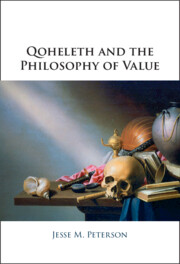
-
Select format
-
- Publisher:
- Cambridge University Press
- Publication date:
- June 2025
- July 2025
- ISBN:
- 9781009513227
- 9781009513258
- Dimensions:
- (229 x 152 mm)
- Weight & Pages:
- 0.64kg, 320 Pages
- Dimensions:
- Weight & Pages:
You may already have access via personal or institutional login
Book description
The book of Ecclesiastes is the Bible's problem child. Its probing doubts, dark ruminations, self- reflexive dialogues, and unflinching observations have simultaneously puzzled and fascinated readers for over two millennia. Some read the book's message as hopelessly pessimistic, while others regard the text as too contradictory to bear any consistent message at all. In this study, Jesse Peterson offers a coherent portrait of the book and its author-the early Jewish sage known as Qoheleth-by examining both through a philosophical lens. Drawing from relevant contemporary philosophical literature on meaning in life, death, well-being, and enjoyment, Peterson outlines a clear and compelling portrait of Qoheleth and his philosophical assumptions about what is good and bad in the human experience. As Peterson argues, Qoheleth's grievances concerning the pursuit of meaning in life are paired with a genuine affirmation of life's value and the possibility of a joy-filled existence.
Reviews
‘Qoheleth, the speaking voice in Ecclesiastes, famously asserts that ‘there is nothing new under the sun.’ Pac that somewhat crabby sage, Jesse Peterson’s erudite volume offers a novel interpretation of Qoheleth in light of contemporary philosophy. Peterson offers compelling readings of Qoheleth’s understanding of meaning (and its lack), death (and its harm), and time (and the limitations it places on agency). But not only that. While Qoheleth doubts the possibility of a meaningful life, Peterson demonstrates that Qoheleth knows of a life of value in which an attitudinal theory of pleasure and valuing capacities play crucial roles. Peterson reveals an image of Qoheleth as no mere pessimist, but someone with a mature conception of pleasure and the intrinsic value of the moment. Be prepared to learn a lot from this stunning and learned book; I most certainly did.’
Brent A. Strawn - D. Moody Smith Distinguished Professor of Old Testament and Professor of Law, Duke University
Contents
Metrics
Full text views
Full text views help Loading metrics...
Loading metrics...
* Views captured on Cambridge Core between #date#. This data will be updated every 24 hours.
Usage data cannot currently be displayed.
Accessibility standard: Unknown
Why this information is here
This section outlines the accessibility features of this content - including support for screen readers, full keyboard navigation and high-contrast display options. This may not be relevant for you.
Accessibility Information
Accessibility compliance for the PDF of this book is currently unknown and may be updated in the future.

